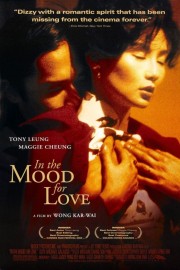In the Mood for Love
There’s a striking simplicity to “In the Mood for Love” that is anything but simple. Here is a film about an affair that doesn’t show an affair, but almost does. It begins with by chance, as two couples rent rooms right next to one another in 1962 Hong Kong. As the film progresses, two people in the quartet realize what is going on, but we do not get the sort of scenes we typically get in films about affairs and infidelity. Instead, we are left solely by what the affair is doing to the two people; the result is a beautiful and painful film about repressed love, and a lifetime lost, not necessarily through any fault of their own. This was my first time with Wong Kar-Wai’s masterpiece; I doubt it will be my last.
There are voices for Mrs. Chan and Mr. Chow, but we never actually see them. At the beginning of the film, it is just Mr. Chan (Tony Leung) and Mrs. Chow (Maggie Cheung) looking for rooms to rent. When Mrs. Chow rents the room from Mrs. Suen first, the landlady sends Mr. Chan next door to Mr. Koo. The two couples move in on the same day, and sometimes, the wrong stuff is sent to the wrong apartment. The routine goes from there- Mrs. Chow and Mr. Chan work late, leaving their spouses to fend for themselves; eventually, they find themselves frequenting the same place for noodles each night, and they eventually strike up conversations. Is it that her boss, Mr. Ho (Kelly Lai Chen), seems to always have her contact his wife, telling her he’s going to be late, that makes Mrs. Chow suspicious of the truth? No matter, when she confronts Mr. Chan with her suspicions, he appears to have had the same ones, and the two become close, propelling them towards a romance they seem hesitant to indulge in, regardless of whether the feelings are there or not.
I hope that, in finally watching “In the Mood for Love,” I will work my way through his filmography at last- I have seen a few of his films in the past, but I’m not familiar enough with his work to formulate a strong opinion of it. “In the Mood for Love” is a wonderful place to begin, though. The way he plays with our expectations of the narrative, and allows us (and the characters) to work things out for themselves is most welcome as a viewer. Having this be from he perspective of his two main characters as they help each other process their feelings not only about the affair, but about each other, makes this a unique study in betrayal, and longing. A lesser film would have had them fall into bed for revenge, and the fallout be the driving force of the rest of the film. Here, the drama is almost entirely internal, and a scene of Mrs. Chow stuck in Mr. Chan’s room while the landlords (well, the women, at least) play mahjong in the Koo’s apartment has the tension of a Hitchcock set piece. At that point, however, they don’t feel a romantic pull, so what would be the harm in her in his room? It’s all about insinuation, and it’s that which leads Mr. Chan (a journalist trying to write a martial arts serial for the paper) to take a job in Singapore later in the film; he asks if she wants to join him, but she is too late to do so- another opportunity missed.
This feels like an epic love story, but at 98 minutes long, it moves at a brisk and precise pace, with an intimacy many of the great love stories have. The cinematography by Christopher Doyle and Mark Lee Ping Bin and production design by William Chang work together to create an elegant visual look that captures the period, and Wong Kar-Wai’s sensual, dream-like atmosphere. The music is a collection of original compositions and previously-recorded tracks that makes the film a singularly beautiful experience in a way that would make Kubrick proud with how perfectly it works with the images. As the third act of the film moves past 1962, and shows us what became of these characters, we see paths that crossed, but are not sure whether their lives went along the way they should have. “In the Mood for Love” doesn’t have easy answers for them, or for us.










